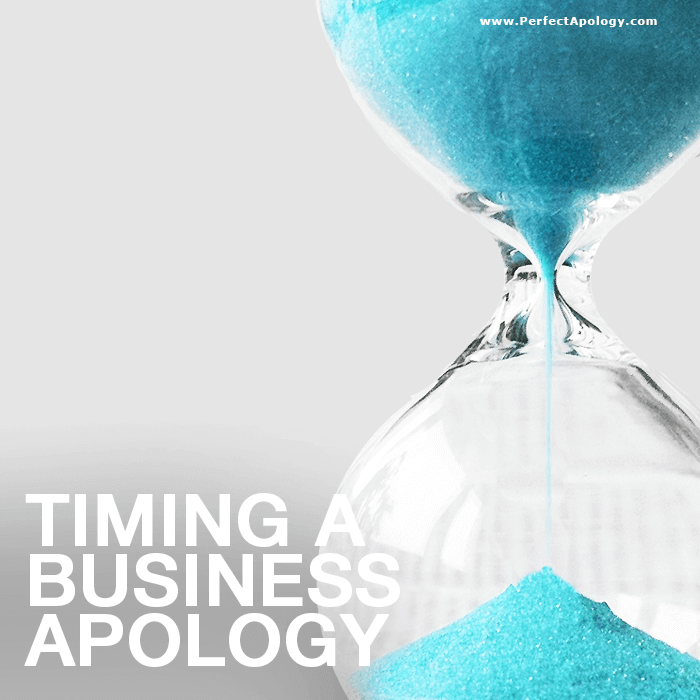Apology Timing in Business
When should you deliver the apology? How does timing an apology correctly affect the way it's perceived? Does every incident require immediate action or do some situations warrant a delay?

As we illustrated in the example of a typical customer apology letter, timing an apology correctly with a quick response to a business error can actually benefit the company and build on customer loyalty.
There are very few cases when it's best to hold off on apologizing, especially in business.
However, if the incident could result in ANY form of legal action or liability with ANY party then delaying a response to seek the legal advice of an attorney is VERY prudent. Follow this link to learn more about the legal implications of business apologies.
Apologies are about acknowledging a mistake or wrongdoing, and their effectiveness is largely determined by the offended party believing in their sincerity.
Poor timing or a delay in delivering a business apology could raise questions about your sincerity or imply ulterior motives. In either case, it's bad for business.
Well-Timed Apologies Are Good For Business
When a business apology is well-timed it can both help alleviate any concerns and solidify relationships.
For example,
'Company B' is a vendor of 'Company A' whose last shipment of product was unsatisfactory. The company advises the vendor of the situation with a detailed account of the poor quality of goods they received. The vendor, for some reason, holds off on extending an apology for the substandard shipment.
How does timing an apology play into how the apology is perceived? How does the relationship between the two companies change as a result of poor timing?
By waiting, the company that received the poor quality goods is now more likely to question the integrity of the vendor. They'd be considering the reasons why the vendor didn't apologize and acknowledge the problem with their product when there's tangible evidence of defective goods?
Some of the likely conclusions they will draw on the vendor are:
→ They can't be relied on to deliver as promised.
→ The company has no long-term vision or integrity.
→ The company is only interested in making money.
Once an individual or group begins to think of the vendor in these terms the dynamic of the relationship will have changed.
If a business apology is issued too late, it will likely be viewed as insincere or, worse, as a shallow effort to de-escalate the conflict to avoid further action. In our case, the vendor will still be viewed as untrustworthy and, therefore, unworthy of future business.
However, a well timed apology in the same situation can produce significantly more positive (and profitable) results.
With proper timing, the apology is now more likely to be viewed as sincere. As a result, the company will gain more trust and integrity while creating the impression it has long term vision and cares about its customers thereby solidifying its relationships.
Timing, Half an Apology & No Apology at All
Common sense tells us that any apology should be better than no apology at all. Research suggests otherwise. In business it appears that intuition and common sense may not be a sufficient framework for crafting an apology.
An article published in INC. Magazine by Allison Stein Wellner reviews some very interesting insights gained from research on business apologies; insights that directly contradict the myth that something is always better than nothing.
Wellner cites research by Jennifer K. Robbennolt (University Illinois) on the feedback of 145 professionals to situations that involved some form of apology, mostly in context of an accident and legal settlement.
According to the research, apologies that follow most if not all of the elements of a perfect apology were much more likely to support settlements (in fact, 73% of the cases) while only 35% were willing to settle when a partial apology was offered.
The most interesting and relevant result from the study is that 52% of respondents were willing to settle without having been offered any apology at all.
The point, it seems, is that more of an apology (one that is as close as possible to what we outline on this site) is better than less, but not enough of an apology can sometimes be worse than no apology at all.
The key takeaway for business apologies, according to Wellner, is that the wronged person believes the offender truly grasps the situation and what they have done.
Wellner also considers timing to be critical.Delaying or waiting too long can backfire.
She concludes that an apology is much more likely to be well received when the recipient feels that you've had the time to reflect enough on your offenses to feel some form of guilt, regret or remorse.
Sincerity, she cites as another important factor. If you don't intend on changing your behavior it will come through in your apology and you're better off skipping it altogether.
Save your credibility and your mea culpa for a time when you really need it, and more importantly, mean it.
Business, Apologies, Timing & Perception
Since dealing with problems is such a natural and important part of doing business, the perception created by a well timed apology will inevitably enhance the overall value of maintaining the business relationship.
So given the same set of circumstances we can see that timing an apology correctly can make all the difference in how it, and the person or company extending it, are perceived.
See a sample apology letter that the vendor should have issued promptly in this situation to save the relationship and build trust.


